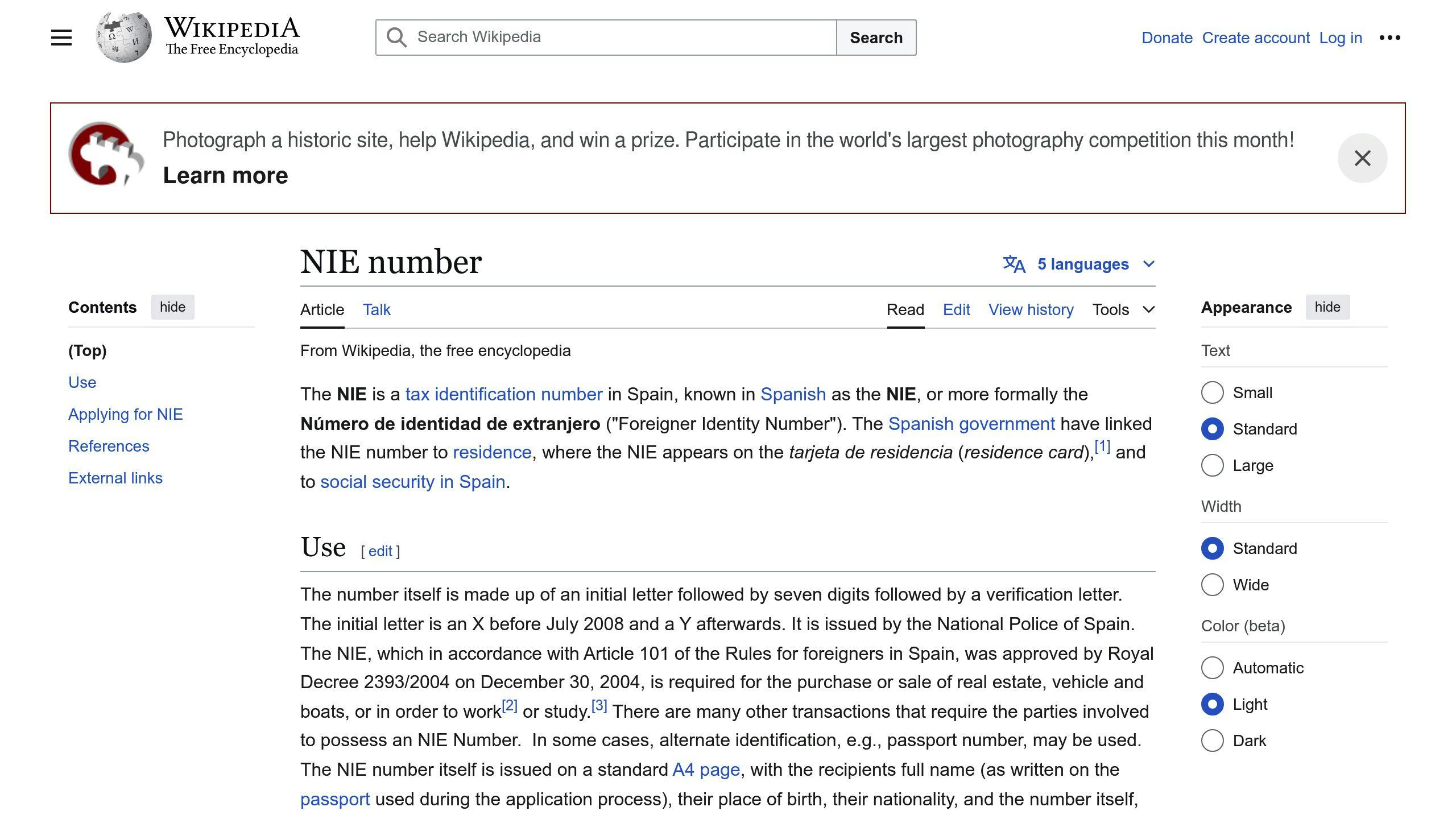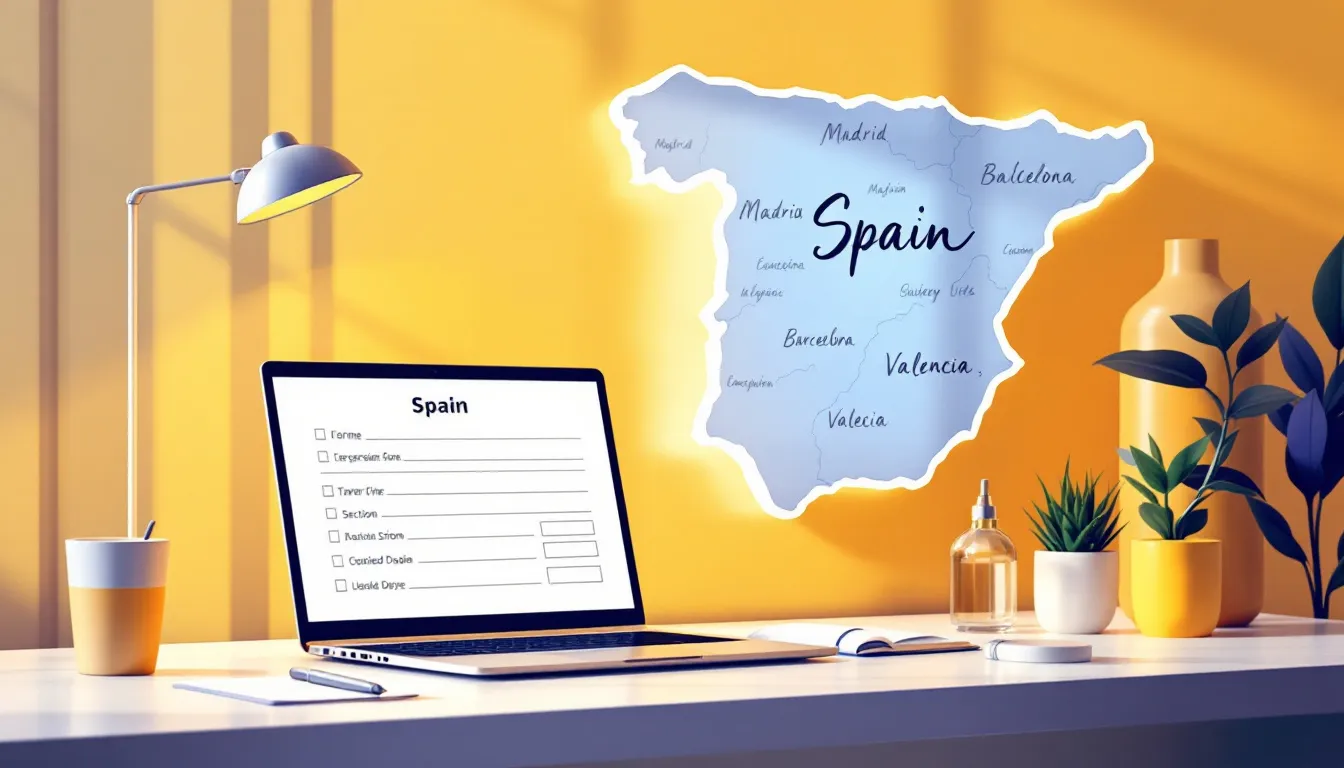Want to open a Spanish bank account? Here's what you need:
- Valid ID (passport or national ID card)
- Address proof (for residents only)
- Income/job proof
- Non-resident certificate (for non-residents)
- Tax ID (NIE)
Quick comparison of resident vs. non-resident accounts:
| Feature | Resident Account | Non-Resident Account |
|---|---|---|
| Fees | Lower | Higher |
| Services | More | Fewer |
| Process | Easier | Tougher |
Key points:
- Gather documents before visiting the bank
- Translate non-Spanish papers
- Check online banking options
- Find non-resident friendly banks if needed
Need help? Consider getting advice from legal experts who specialize in expat banking in Spain.
Related video from YouTube
1. Valid ID
To open a bank account in Spain, you need a valid ID. It's non-negotiable.
For residents and expats:
- Valid passport or national identity card
For non-residents:
- Valid passport (EU citizens can use national ID cards)
Here's a quick look at Spanish ID documents:
| Document | What it is | Who uses it |
|---|---|---|
| DNI | Spanish citizen ID | Spanish nationals |
| NIE | Foreigner ID number | Non-Spanish residents |
| NIF | Tax ID code | People and businesses |
Non-residents: Your ID might need an official Spanish translation. Ask your bank first.
Some banks let non-residents open accounts without an NIE, but options are limited. Check with the bank directly.
Pro tip: Make sure your ID isn't expired before going to the bank. An outdated document = wasted trip.
EU citizens: Your national ID card often works instead of a passport. Handy if you don't want to carry your passport around.
2. Address Proof
Opening a Spanish bank account? You'll need to prove where you live.
Here's what works:
- Utility bills (water, electricity, gas)
- Bank statements
- Rental agreements
"Banks usually want landline or internet bills. Mobile phone bills often don't cut it", a CaixaBank rep tells us.
Your document must:
- Show your full name
- Display your current address
- Be less than 3 months old
No utilities? Try these:
- Bank account certificate
- Rental payment receipt
New to Spain? It's trickier, but here's a workaround:
1. Get the "empadronamiento"
Register at your local town hall with:
- Passport or ID
- Rental contract or property deed
- NIE number (Foreigner's ID)
You'll get a "certificado de empadronamiento" - most banks accept this.
2. Use property documents
Bought a home? Your "Nota Simple" (property registry extract) might work.
| Document | Accepted by | Notes |
|---|---|---|
| Utility bill | Most banks | Landline/internet preferred |
| Bank statement | All banks | Must show address |
| Rental contract | Some banks | With recent payment proof |
| Empadronamiento | All banks | Valid for 3 months |
| Nota Simple | Most banks | For property owners |
"Banks have different rules. Always check what they'll take before you go", a Santander Bank manager advises.
Pro tip: Bring multiple proofs to be safe. Clear, recent documents speed things up.
3. Income or Job Proof
Spanish banks need to know your money's source. It's the law, not nosiness.
Here's what you'll need:
Residents and expats:
- Employment contract
- Recent pay slips (last 3 months)
- Tax return (Declaración de la Renta)
- Student card (if studying)
- Unemployment paperwork (if applicable)
Non-residents:
- Home country payslip
- Home country tax return
- Bank statements showing regular income
Digital nomads and freelancers:
- Freelance contracts
- Client invoices
- Bank statements with regular deposits
"Digital nomads are opening more accounts lately. Consistent income is crucial", says Maria Gonzalez, Sabadell Bank branch manager in Barcelona.
| Document Type | Resident | Non-Resident | Digital Nomad |
|---|---|---|---|
| Employment contract | ✓ | - | - |
| Pay slips | ✓ | ✓ | - |
| Tax return | ✓ | ✓ | - |
| Bank statements | - | ✓ | ✓ |
| Freelance contracts | - | - | ✓ |
| Client invoices | - | - | ✓ |
Key points:
- Use recent documents (last 3 months)
- Translate and apostille foreign papers
- Bring multiple proofs if possible
Banks do this to combat money laundering and check your financial stability. They want to see steady income, not just a lump sum.
"We prefer stability. €2,800 monthly often beats €50,000 in savings", says Juan Pérez, CaixaBank financial advisor.
Moving to Spain? Start collecting these docs early. It'll make your bank visit easier.
sbb-itb-c1c0fc4
4. Non-Resident Certificate
Want to open a Spanish bank account as a non-resident? You'll need a Non-Resident Certificate (or 'Certificado de no Residente' in Spanish).
This document proves you're not living in Spain full-time. Banks need it to open non-resident accounts and follow the rules.
Here's the lowdown:
Getting your certificate:
- Hit up a police station with a foreigner's department
- Visit an immigration office
- Or apply at a Spanish consulate if you're not in Spain
What you'll need:
- Two copies of the EX-15 form
- A copy of your passport or ID
- Proof you need the certificate (like a letter from the bank)
The nitty-gritty:
- Cost: €7.31
- Wait time: About 10 days
- Good for: 3 months
"Get that Non-Resident Certificate early. It trips up a lot of people", says Maria Gonzalez, a Barcelona bank manager.
Pro tips:
- Get your docs ready before you apply
- Translate anything not in Spanish
- Get those translations notarized
Some banks might cut students some slack. Juan Pérez from CaixaBank says, "Students can sometimes use their student cards instead."
| Document | Where to Get | Cost | Wait Time | Good For |
|---|---|---|---|---|
| Non-Resident Certificate | Police station, Immigration office, or Spanish consulate | €7.31 | ~10 days | 3 months |
5. Tax ID
You need a tax ID to open a Spanish bank account. For non-Spaniards, it's called the NIE (Número de Identidad de Extranjero).
The NIE is your key to:
- Banking
- Taxes
- Property purchases
- Employment
Here's how to get one:
1. Gather documents
You'll need:
- Your passport (original and copy)
- A filled-out EX-15 form
- Proof you paid the €10.71 fee
2. Submit your application
Head to a Spanish police station, immigration office, or consulate in your country.
3. Wait it out
It usually takes a few weeks.
| Document | Cost | Processing Time | Validity |
|---|---|---|---|
| NIE | €10.71 | 2-3 weeks | Indefinite |
Some banks might let you open an account with just a passport at first. But you'll need to show your NIE later.
"No NIE? Your financial options in Spain are limited", says Carlos Martínez, a Madrid tax advisor.
Don't wait. Apply for your NIE ASAP to avoid hiccups with your Spanish bank account and other must-have services.
Resident vs. Non-Resident Account Needs
Want to open a bank account in Spain? Your residency status matters. Here's what you need to know:
| Aspect | Resident Account | Non-Resident Account |
|---|---|---|
| Valid ID | Yes | Yes |
| Proof of Address | Yes (Spanish) | No |
| Income/Employment Proof | Yes | Yes |
| Non-Resident Certificate | No | Yes |
| Tax ID (NIE) | Yes | Yes |
| Opening Process | Easier | Tougher |
| Fees | Lower | Higher |
| Services | More | Fewer |
Non-residents, brace yourselves. You'll need:
1. Non-Resident Certificate
It costs about 15€, takes 10 days, and you can get it at a local police station or Spanish consulate.
2. Translated Documents
Your foreign papers? Translate them to Spanish and get them notarized.
3. Bank Hunt
Not all Spanish banks welcome non-residents. Do your homework.
Resident accounts are the clear winners. They offer lower fees, more services, credit options, and full online banking. Non-resident accounts? Higher fees, fewer perks, and basic online banking.
"Resident accounts in Spain are like VIP passes. Non-resident accounts? More like general admission tickets", says María Gómez from CaixaBank.
Wrap-up
Opening a Spanish bank account? Here's what you need:
- Valid ID: Passport or national ID card
- Address Proof: Spanish proof for residents only
- Income/Job Proof: For everyone
- Non-Resident Certificate: €15, non-residents only
- Tax ID (NIE): Required for all accounts
Your residency status matters:
| Account Type | Fees | Services | Opening Process |
|---|---|---|---|
| Resident | Lower | More | Easier |
| Non-Resident | Higher | Fewer | Tougher |
Quick tips:
- Gather docs first
- Translate to Spanish
- Check online options
- Find non-resident friendly banks
Stuck? Get help from legal experts who know the ropes for expats and international entrepreneurs in Spain.
FAQs
Do I need an NIE number to open a bank account in Spain?

You usually need an NIE number for a Spanish bank account. But some banks let non-residents open accounts without one.
As of August 2024, these banks might let you open an account without an NIE:
| Bank | No NIE Account |
|---|---|
| LaCaixa | Maybe |
| Bankinter | Maybe |
| Santander | Maybe |
| Sabadell | Maybe |
Remember: Each bank has its own rules. These can change.
No NIE? Here's what to do:
- Call the banks
- Ask about their current rules
- Explain your situation clearly
Your specific case matters. Some banks might say yes, others no. It's best to check directly with them.


